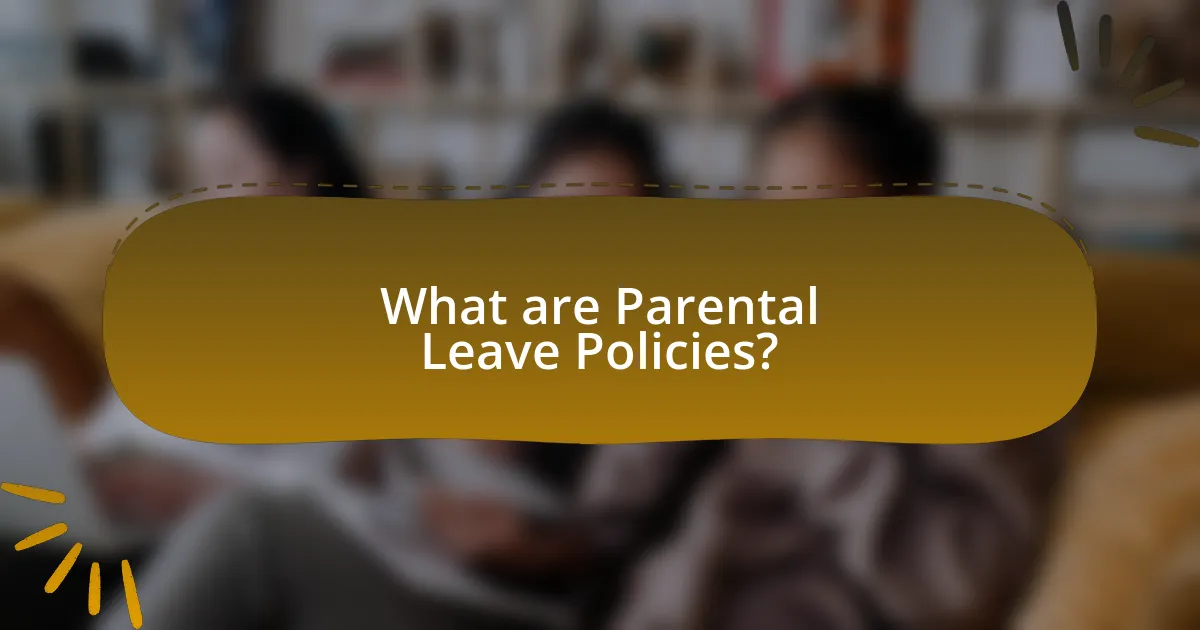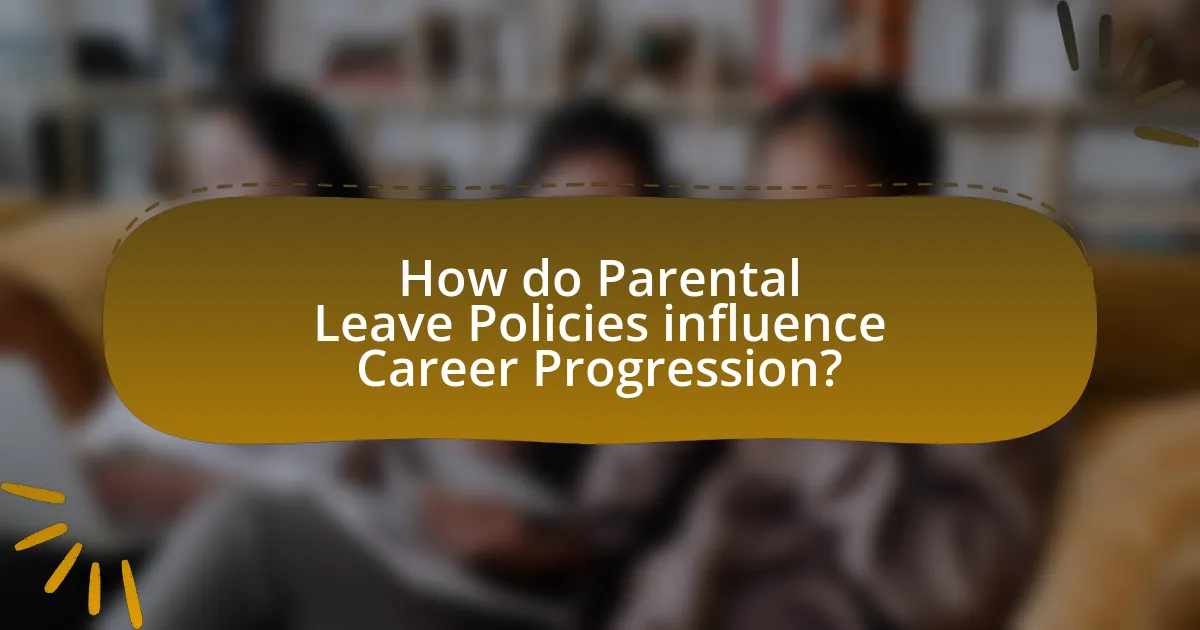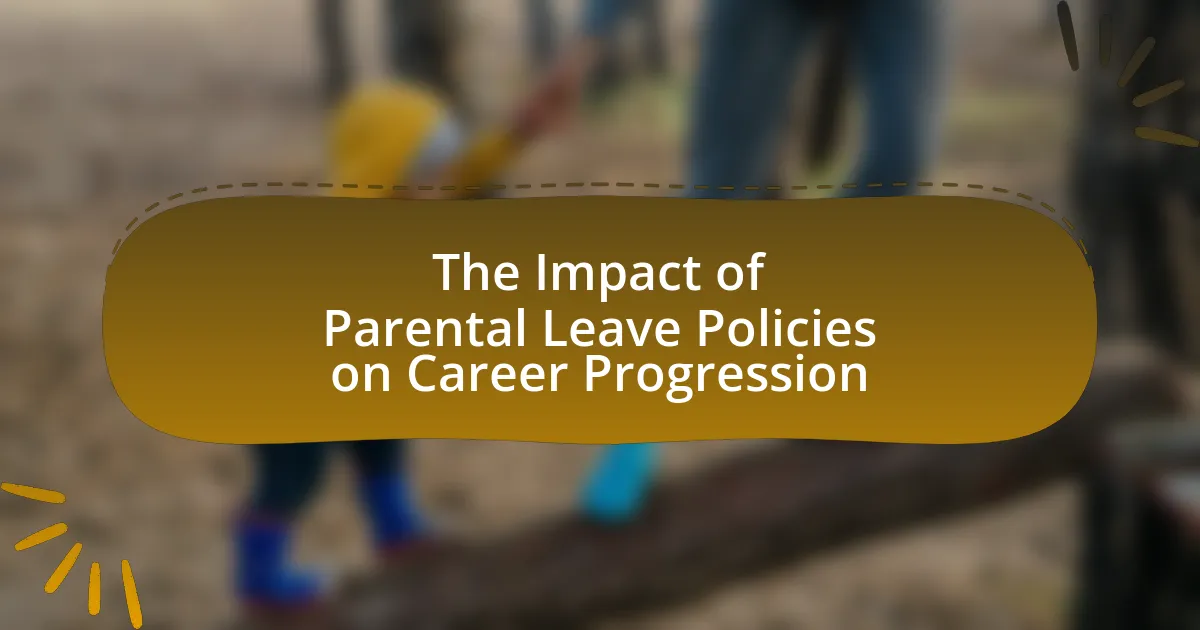Parental leave policies are regulations that allow employees to take time off for the care of newborn or newly adopted children, often providing job protection and varying levels of pay. This article examines the impact of these policies on career progression, highlighting how they differ across countries, the key components of effective policies, and the influence of cultural attitudes on their implementation. It also explores the implications of parental leave on child development, family dynamics, and the long-term career effects for both men and women, including challenges faced when taking leave and strategies for organizations to improve their policies. The findings underscore the importance of supportive parental leave policies in promoting gender equality and enhancing employee retention and satisfaction.

What are Parental Leave Policies?
Parental leave policies are regulations that allow employees to take time off from work to care for their newborn or newly adopted children. These policies typically provide job protection and may offer paid or unpaid leave, depending on the jurisdiction and specific company policies. For instance, in the United States, the Family and Medical Leave Act (FMLA) entitles eligible employees to take up to 12 weeks of unpaid leave for family-related reasons, including the birth or adoption of a child. Research indicates that comprehensive parental leave policies can positively influence career progression by reducing the stigma associated with taking leave and promoting gender equality in the workplace.
How do Parental Leave Policies vary across different countries?
Parental leave policies vary significantly across countries in terms of duration, pay, and eligibility. For instance, Sweden offers up to 480 days of paid parental leave, with 90 days reserved specifically for each parent, promoting shared responsibility. In contrast, the United States does not mandate paid parental leave at the federal level, leaving it to employers to provide such benefits, resulting in a patchwork of policies. Countries like Canada provide up to 18 months of leave with varying pay rates, while Japan offers 12 months of leave with a high percentage of income replacement. These differences reflect cultural attitudes towards family and work, influencing career progression for parents in each country.
What are the key components of effective Parental Leave Policies?
Effective parental leave policies include adequate duration of leave, job protection, and financial support. Adequate duration typically ranges from several weeks to several months, allowing parents to bond with their child without the stress of immediate return to work. Job protection ensures that employees can return to their previous position or a comparable one, safeguarding their career progression. Financial support, often in the form of paid leave, alleviates economic burdens during this critical time, promoting a healthier work-life balance. Research indicates that countries with comprehensive parental leave policies, such as Sweden and Norway, see higher rates of workforce participation among parents, demonstrating the positive impact on career progression.
How do cultural attitudes influence Parental Leave Policies?
Cultural attitudes significantly influence parental leave policies by shaping societal expectations regarding gender roles and family responsibilities. In cultures that prioritize traditional gender roles, parental leave policies often favor mothers, reflecting the belief that caregiving is primarily a woman’s responsibility. For instance, countries like Sweden, which embrace egalitarian values, offer generous parental leave for both parents, resulting in higher rates of fathers taking leave. Research by the OECD indicates that in Sweden, approximately 90% of fathers utilize parental leave, demonstrating how cultural norms can promote shared parenting responsibilities. Conversely, in cultures with less progressive views on gender equality, such as in some parts of the United States, parental leave policies tend to be less supportive, often resulting in minimal or no paid leave, which can hinder both parents’ ability to balance work and family life. Thus, cultural attitudes directly shape the structure and accessibility of parental leave policies, impacting career progression for both mothers and fathers.
Why are Parental Leave Policies important for families?
Parental leave policies are important for families because they provide essential time for parents to bond with their newborns and support their family’s well-being. Research indicates that adequate parental leave contributes to better physical and mental health outcomes for both parents and children, fostering secure attachments and reducing stress. For instance, a study published in the Journal of Health Economics found that longer parental leave is associated with lower rates of postpartum depression and improved child development outcomes. These policies also enable parents to balance work and family responsibilities, which can lead to increased job satisfaction and retention, ultimately benefiting the family’s financial stability.
What impact do these policies have on child development?
Parental leave policies significantly influence child development by promoting secure attachment and emotional well-being. Research indicates that when parents have access to paid leave, they are more likely to spend quality time with their newborns, which fosters bonding and reduces stress for both the parent and child. A study published in the Journal of Child Psychology and Psychiatry found that children whose parents took extended leave exhibited better cognitive and social skills compared to those whose parents did not. Furthermore, these policies can lead to improved mental health outcomes for children, as parents who are less stressed are more capable of providing nurturing environments.
How do Parental Leave Policies affect family dynamics?
Parental leave policies significantly influence family dynamics by promoting shared caregiving responsibilities and enhancing family bonding. When both parents have access to paid leave, they are more likely to engage in childcare together, which fosters a collaborative parenting approach. Research indicates that countries with generous parental leave policies, such as Sweden and Norway, report higher levels of paternal involvement in early child-rearing, leading to improved emotional and developmental outcomes for children. Additionally, these policies can reduce stress and improve mental health for both parents, as they feel supported in their roles. Studies show that families utilizing parental leave experience better communication and relationship satisfaction, reinforcing the importance of these policies in shaping positive family dynamics.

How do Parental Leave Policies influence Career Progression?
Parental leave policies significantly influence career progression by affecting employee retention, job satisfaction, and gender equality in the workplace. Research indicates that organizations with supportive parental leave policies experience lower turnover rates, as employees feel valued and are more likely to remain with their employer after taking leave. For instance, a study published in the Journal of Labor Economics found that companies offering paid parental leave saw a 20% increase in retention rates among new parents. Additionally, these policies contribute to higher job satisfaction, as employees perceive a better work-life balance, leading to increased productivity and engagement. Furthermore, parental leave policies promote gender equality by encouraging both parents to take leave, which can help mitigate the career penalties often faced by women. According to a report by the Institute for Women’s Policy Research, equitable parental leave policies can reduce the gender wage gap by allowing both parents to share caregiving responsibilities, thus supporting women’s long-term career advancement.
What are the potential career impacts of taking parental leave?
Taking parental leave can lead to both positive and negative career impacts. On the positive side, employees may experience increased job satisfaction and loyalty, which can enhance their long-term career prospects. Research indicates that companies with supportive parental leave policies often see higher retention rates, as employees feel valued and supported during significant life events. Conversely, negative impacts may include potential career stagnation or slower advancement, as taking time off can lead to missed opportunities for promotions or critical projects. A study published in the Journal of Labor Economics found that women who take extended parental leave may face a wage penalty, with earnings decreasing by up to 7% for each year of leave taken. Thus, while parental leave can foster a supportive work environment, it may also pose challenges to career progression, particularly for women.
How does parental leave affect promotions and salary increases?
Parental leave negatively affects promotions and salary increases for many employees, particularly women. Research indicates that taking parental leave can lead to a perception of decreased commitment to the job, which may hinder career advancement opportunities. A study published in the Journal of Labor Economics found that women who took maternity leave experienced a 7% reduction in their likelihood of receiving a promotion compared to those who did not take leave. Additionally, salary increases were often lower for employees who utilized parental leave, with a report from the Institute for Women’s Policy Research highlighting that women who took leave earned approximately 5% less than their peers over a 10-year period. These findings illustrate the adverse impact of parental leave on career progression, particularly in terms of promotions and salary growth.
What are the long-term career effects for individuals who take parental leave?
Individuals who take parental leave often experience long-term career effects such as slower career advancement and potential wage penalties. Research indicates that employees who utilize parental leave may face challenges in achieving promotions compared to their peers who do not take leave. For instance, a study published in the Journal of Labor Economics found that women who took maternity leave had a 7% lower likelihood of being promoted within the following five years compared to those who did not take leave. Additionally, a report by the Institute for Women’s Policy Research highlighted that mothers returning from leave often earn less than their counterparts, with a wage gap of approximately 4% to 10% in the years following their return. These findings suggest that while parental leave is essential for family well-being, it can have significant implications for long-term career trajectories and earnings.
How do gender differences play a role in the impact of Parental Leave Policies?
Gender differences significantly influence the impact of Parental Leave Policies on career progression. Research indicates that women are more likely to take extended parental leave compared to men, which can lead to career interruptions and slower advancement in their professional trajectories. For instance, a study published in the Journal of Labor Economics found that women who take longer maternity leaves experience a 7% decrease in their earnings over time compared to those who take shorter leaves. Conversely, men often take shorter leaves, which can enhance their career prospects and reinforce traditional gender roles in the workplace. This disparity in leave-taking behavior contributes to the gender pay gap and affects overall workplace equality, as women may face challenges in returning to their previous roles or achieving promotions after extended absences.
What challenges do men face when taking parental leave?
Men face several challenges when taking parental leave, primarily related to workplace culture and societal expectations. Many men encounter stigma or negative perceptions from colleagues and supervisors, which can lead to concerns about career advancement and job security. Research indicates that men who take parental leave may be viewed as less committed to their jobs, potentially impacting their opportunities for promotions and raises. Additionally, men often experience pressure to conform to traditional gender roles, which can discourage them from utilizing available leave. According to a study published in the Journal of Family Issues, men are less likely to take parental leave compared to women, with only 10% of fathers in the U.S. taking advantage of paid leave policies, highlighting the societal barriers they face.
How do women’s career trajectories differ after taking parental leave?
Women’s career trajectories often experience setbacks after taking parental leave, leading to slower advancement compared to their male counterparts. Research indicates that women who take parental leave may face challenges such as reduced opportunities for promotions, wage penalties, and a higher likelihood of exiting the workforce altogether. For instance, a study published in the Journal of Labor Economics found that women who took extended parental leave experienced a 7% decrease in their earnings in the following years compared to those who did not take leave. Additionally, women are often perceived as less committed to their careers after taking time off, which can hinder their professional growth and networking opportunities.

What are the challenges associated with Parental Leave Policies and Career Progression?
Parental leave policies present challenges that can hinder career progression, particularly for women. Research indicates that taking extended leave can lead to perceptions of decreased commitment and capability, which may result in fewer promotions and opportunities for advancement. For instance, a study by the Institute for Women’s Policy Research found that women who take maternity leave are often viewed as less dedicated, impacting their long-term career trajectories. Additionally, the lack of adequate support systems during and after leave can exacerbate feelings of isolation and hinder reintegration into the workplace, further complicating career advancement.
What barriers do employees face when utilizing parental leave?
Employees face several barriers when utilizing parental leave, including workplace culture, financial constraints, and lack of support from management. Workplace culture often discourages taking leave due to fears of stigma or negative perceptions regarding commitment and productivity. Financial constraints arise when employees cannot afford to take unpaid leave or when paid leave is insufficient to cover living expenses. Additionally, lack of support from management can manifest in inadequate communication about leave policies, leading to confusion and reluctance to utilize available benefits. Research indicates that these barriers can significantly impact employees’ decisions to take parental leave, ultimately affecting their career progression and job satisfaction.
How do workplace cultures affect the decision to take parental leave?
Workplace cultures significantly influence the decision to take parental leave by shaping employee perceptions and expectations regarding support and acceptance. In organizations with supportive cultures, employees are more likely to feel encouraged to utilize parental leave, as these environments often promote work-life balance and prioritize family needs. Conversely, in cultures that stigmatize taking leave or emphasize continuous work commitment, employees may hesitate to take parental leave due to fear of negative repercussions on their career progression. Research indicates that companies with family-friendly policies and a culture that values employee well-being see higher rates of parental leave uptake, demonstrating the direct correlation between workplace culture and parental leave decisions.
What role does employer support play in the effectiveness of parental leave?
Employer support significantly enhances the effectiveness of parental leave by fostering a positive environment that encourages employees to utilize their leave without fear of negative career repercussions. Research indicates that when employers actively promote parental leave policies and provide resources, such as flexible work arrangements and communication about job security, employees are more likely to take full advantage of their leave. For instance, a study published in the Journal of Applied Psychology found that organizations with supportive cultures saw a 30% increase in the likelihood of employees taking their full parental leave entitlement, which in turn positively impacted their job satisfaction and retention rates. This support not only aids in the well-being of employees but also contributes to a more equitable workplace, ultimately influencing career progression positively.
How can organizations improve their Parental Leave Policies?
Organizations can improve their parental leave policies by offering more flexible leave options and ensuring equitable access for all employees. Flexible leave allows parents to choose how much time they need and when to take it, which can lead to better work-life balance and increased employee satisfaction. Research indicates that companies with generous parental leave policies experience higher retention rates and employee engagement, as seen in a study by the Institute for Women’s Policy Research, which found that paid leave can reduce turnover by 50%. Additionally, organizations should actively promote awareness of these policies to ensure all employees understand their rights and benefits, thereby fostering an inclusive workplace culture.
What best practices can companies adopt to support employees on parental leave?
Companies can adopt several best practices to support employees on parental leave, including offering flexible leave options, maintaining open communication, and providing resources for a smooth transition back to work. Flexible leave options allow employees to choose the duration and timing of their leave, which can enhance their well-being and job satisfaction. Open communication ensures that employees feel supported and informed about their rights and benefits during their leave. Additionally, providing resources such as training programs or mentorship upon their return can help employees reintegrate into the workplace effectively. Research indicates that companies with supportive parental leave policies experience higher employee retention rates and improved morale, which ultimately contributes to a more productive work environment.
How can organizations measure the effectiveness of their parental leave policies?
Organizations can measure the effectiveness of their parental leave policies by analyzing employee retention rates, productivity levels, and employee satisfaction surveys. Retention rates provide insight into whether employees feel supported and valued, as high retention post-leave indicates a positive policy impact. Productivity levels can be assessed through performance metrics before and after leave, revealing any changes in work output. Employee satisfaction surveys specifically targeting parental leave experiences can yield qualitative data on perceived support and policy effectiveness. Research shows that companies with supportive parental leave policies often see a 25% increase in employee satisfaction, which correlates with improved retention and productivity.
What practical tips can employees consider when navigating Parental Leave Policies?
Employees should familiarize themselves with their company’s parental leave policies to effectively navigate them. Understanding the specific terms, duration, and eligibility criteria of the policy allows employees to plan their leave strategically. For instance, knowing whether the leave is paid or unpaid can influence financial planning during this period. Additionally, employees should communicate openly with their supervisors about their intentions and any potential impacts on their workload, which can foster support and understanding. Research indicates that employees who engage in proactive discussions about their leave experience less stress and maintain better relationships with their employers. Furthermore, documenting all communications and agreements regarding parental leave can provide clarity and serve as a reference if disputes arise.
